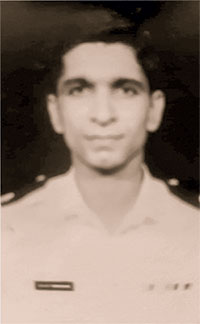SPECIAL REPORT : Part 441
The founder of the Pohottuwa party, Basil Rajapaksa, has suffered a severe setback. All political parties, represented in Parliament, sunk their differences to bring back constitutional impediment that prevents Basil Rajapaksa’s return to Parliament. The UNP’s only MP, Wajira Abeywardena, and the vast majority of the145-member SLPP parliamentary group, voted for 21st Amendment that would thwart Basil Rajapaksa for the time being. UNP leader Ranil Wickremesinghe wouldn’t have secured the presidency on July 20 to complete the remainder of ousted President Gotabaya Rajapaksa’s five-year term, without Basil Rajapaksa’s blessings. At the behest of the strongman, the SLPP voted for Ranil Wickremesinghe. The UNPer won at the expense of Dullas Alahapperuma, who obtained 82 votes, mostly SJBers, whereas Wickremesinghe secured 134. The enactment of the 21st Amendment seemed to have stalled Basil Rajapaksa, on his tracks, having aspired to be national leader at any cost.
By Shamindra Ferdinando
Former Health Minister Pavitradevi Wanniarachchi recently declared that regardless of who served as the President, that person should abide by the decisions taken by twice President Mahinda Rajapaksa.
Ratnapura District SLPP (Sri Lanka Podujana Peramuna) lawmaker emphasized that Mahinda Rajapaksa’s word, on whatever matter, should be accepted by all, including the President, regardless of the consequences.
Ever the blind Mahinda Rajapaksa loyalist, Wanniarachchi said so at the launch of the SLPP campaign meant to revive the party, amidst continuing deterioration of its position, both in and outside Parliament. The declaration was made at the meeting chaired by Mahinda Rajapaksa, at Kalutara, on Oct 08, close on the heels of calling off the vote on the 21st Amendment to the Constitution. The vote that was to be taken in the first week of October had to be put off due to the warning issued by the SLPP.
MP Wanniarachchi faulted ousted President Gotabaya Rajapaksa for the heavy setbacks suffered by the SLPP. Declaring that only those with political background should have been given top posts in their government, the Ratnapura District MP alleged that the SLPP suffered as a result of its pathetic failure to provide jobs.
Turning towards Mahinda Rajapaksa, and sounding more like a frivolous schoolgirl, rather than the Attorney-at-Law she is, Wanniarachchi recalled how she, in her capacity as Minister of Youth Affairs and Samurdhi, provided jobs for her supporters in the public sector. Appreciating the support extended by the then President Mahinda Rajapaksa for her endeavours, MP Wanniarachchi lashed out at President Gotabaya Rajapaksa for depriving her of that opportunity.
Exposing more of her immature and selfish thinking, despite the terrible situation the country is facing, the former Health Minister alleged that she couldn’t recruit even one supporter, during her tenure as Health Minister whereas her predecessors, Maithripala Sirisena, and Nimal Siripala de Silva, recruited 10,000 each. Obviously, she hadn’t heard, or taken any notice of the ongoing debate over how massive expansion of the public service contributed to the unprecedented economic fallout.
Public Administration Secretary Priyantha Mayadunne, in late May this year, didn’t mince his words when he warned political parties, represented in Parliament, state and private sector trade unions, and the civil society, that they would soon be categorized as traitors unless they agreed to a far reaching economic reforms agenda.
In late August, the Governor of the Central Bank, Dr. Nandalal Weerasinghe, vigorously assailed the political party system when he was invited by Speaker Mahinda Yapa Abeywardena to address the members of Parliament. Soft spoken Dr. Weerasinghe dealt with the current situation, and related issues at hand. The CB Governor flayed those who governed the country, including the present lot, for bankrupting the country.
Obviously, MP Wanniaarachchi didn’t care or seemed to have conveniently turned a blind eye to ground realities. Otherwise she wouldn’t have blamed Gotabaya Rajapaksa for not allowing her, as well, to further expand the public service, now an unbearable burden on the taxpayer. She had also forgotten the daunting challenge posed by Covid-19, at that time, and the national economy was in such a precarious state a large scale recruitment campaign would have been unthinkable.
A week later, the SLPP followed up with the second meeting of its propaganda campaign. The second meeting, held at Mahindananda Aluthgamage’s Nawalapitiya stronghold, was meant to consolidate the SLPP. However, last week it, and the man who behaved as its godfather, dual citizen Basil Rajapaksa, may have suffered an irreparable setback when the Parliament overwhelmingly voted for the 21st Amendment. A staggering 179 members voted for the new amendment, during the division held at the end of the second reading, whereas just one SLPP, MP Rear Admiral Sarath Weerasekera, voted against it. Subsequently, at the third reading of the Bill, 174 voted in favour, and Sarath Weerasekera again voted against the Bill. Of the 179, who voted for the new law, five refrained from doing so in the third division. Weerasekera had the guts to stand by his principles and voted against the 19th Amendment.
The Navy veteran declared, in Parliament that he couldn’t vote for the 21st Amendment that was meant to revive the 19th Amendment that he then, too, opposed it alone. His stand should be applauded as no other MP, serving the current Parliament, had the strength to take a principled stand. On that day, during the crucial vote, 45 lawmakers hadn’t been present.
A large section of the Rajapaksa Camp abstained, though Chamal Rajapaksa, his son Shasheendra Rajapaksa, and Namal Rajapaksa, voted for it. Among those who skipped the vote was the chief organizer of the Kalutara public rally, MP Rohitha Abeygunawardena and Pavitradevi Wanniarachchi. However, in spite of being dubbed as a staunch Rajapaksa loyalist, Mahindananda Aluthgamage voted for the 21st Amendment. The following is the list of government MPs, not present in Parliament, on that day: Mahinda Rajapaksa, Pavitra Wanniarachchi, Gamini Lokuge, Sanath Nishantha, Sagara Kariyawasam, Jayantha Ketagoda, Sanjiva Edirimanne, Prasanna Ranatunga (overseas), Mahinda Amaraweera (overseas), Prameetha Bandara Tennakoon (overseas), Anuradha Jayaratne (overseas), Siripala Gamlath (overseas), Dr. Seetha Arambepola (overseas), Rohitha Abeygunawardena (overseas), S.M.M. Mushraff (overseas), Maj. Pradeep Udugoda (overseas), Nipuna Ranawaka (overseas), Wimalaweera Dissanayake (hospitalized), Sahan Pradeep Withana (hospitalized), Jayantha Weerasinghe (sick), Janaka Bandara Tennakoon (sick), S.M. Chandrasena (State funeral of Ven. Pallegama Siriniwasa), Johnston Fernando (have to attend Court) and Nalaka Bandara Kottegoda (wedding of his brother)
Jathika Jana Balavegaya (JJB) lawmakers, Anura Kumara Dissanayake, Vijitha Herath and Dr. Harini Amarasuriya voted for the new law, while four out of the10 Tamil National Alliance (TNA) MPs skipped the vote. Rebel SLPP MP Prof. G.L. Peiris was out of the country whereas his group voted for the new amendment. The former Foreign Minister would have definitely voted for the new law if he was present in Parliament, on Oct 21. Other notable absentees were Speaker Mahinda Yapa Abeywardena, Chief Government Whip Prasanna Ranatunga, Johnston Fernando and Sagara Kariyawasam. As party General Secretary Attorney-at-law Kariyawasam wielded immense power being close to Basil Rajapaksa.
Of the 40 parliamentarians, who abstained, approximately 30 skipped the vote over the following issues: (a) With the passage of the new Amendment, anyone who is a dual citizen will no longer be allowed to be a member of Parliament, and present dual-citizen MPs will also lose their seats (b) The constitutional amendment also allows the President to dissolve the Parliament after two and a half years of a Parliament being elected.
In addition to the above-mentioned issues that infuriated former Finance Minister Basil Rajapaksa, the new law also ensured a role for the Opposition Leader in the appointment of civil society members to the constitutional council.
Prez consolidates his position
President Ranil Wickremesinghe has consolidated his position at the expense of the SLPP. At the time the then President Gotabaya Rajapaksa invited Wickremesinghe to accept the premiership, on May 12, he wouldn’t have envisaged losing the presidency to the UNP leader. The SLPP, too, wouldn’t have realized the consequences of electing Wickremesinghe, on July 20, to complete Gotabaya Rajapaksa’s term. The SLPP voted for Wickremesinghe, at the expense of Dullas Alahapperuma, who managed to poll 82 votes, while the winner obtained 134. The SLPP’s strategy caused another split in the party as 13 of its members broke ranks. The SLPP dismissed the challenge posed by the dissidents. They were denied the opportunity to speak in Parliament. Key members were also deprived of positions in the coveted parliamentary committees.
Friday’s vote proved that of the 145-member SLPP parliamentary group, elected at the 2020 August parliamentary election, it has been reduced to between 20 to 30. The Rajapaksas, who voted for the 21st Amendment, are among that group. Chamal Rajapaksa, his son Shasheendra Rajapaksa, holding state ministerial post, and Namal, aspiring to re-join the Cabinet, move can be safely described as a precautionary measure. The SLPP is in a dilemma. The once powerful political grouping is now in a political minefield. But, the Rajapaksa group should never be underestimated to prevent unnecessary complications.
It would be pertinent to mention that a section of the SLPP parliamentary group (Vasudeva Nanayakkara, Wimal Weerawansa, Udaya Gammanpila, Gevindu Cumaratunga et al) vigorously campaigned to retain the 19th Amendment provision on dual citizenship. The 19th Amendment, enacted in 2015, disallowed dual citizens from contesting parliamentary or presidential elections. They refused to vote for the 20th Amendment over the discarding of that provision. But, they changed their stand after getting an assurance from President Gotabaya Rajapaksa, that provision would be included in the proposed new Constitution. The new Constitution project never materialized, though a nine-member expert team, led by President’s Counsel Romesh de Silva ,drafted a new Constitution.
Although many asserted that the enactment of the 21st Amendment diluted executive powers, the incumbent President retained sufficient powers to face political challenges. Contrary to speculation, President Wickremesinghe is very much unlikely to exercise conditional authority to dissolve Parliament, two and half years after the first meeting of the incumbent Parliament. Wickremesinghe is expected to complete the remainder of Gotabaya Rajapaksa’s five-year term. The UNP leader wouldn’t, under any circumstances, explore the possibility of holding early parliamentary elections as his party wouldn’t be able to take any advantage from it in the current state of the country.
With just one seat in Parliament, the UNP is not in a position to face early elections at a time the country is experiencing severe economic difficulties. Chances of re-unification with the main Opposition, Samagi Jana Balavegaya (SJB), their erstwhile colleagues at the moment, also seem unworkable, unless the UNP can engineer a mass exodus from the SJB.
The Thilini-Janaki affair reverberates
Before the vote on the 21st Amendment, Justice Minister Wijeyadasa Rajapakse, PC, raised a privilege issue over the reportage of Thilini Priyamali’s case, by a section of the media. Denying a statement attributed to Maithree Gunaratne, PC, that the alleged fraudster was represented by lawyers from Wijeyadasa Rajapaksa’s chambers, an angry Minister alleged that some journalists could be bought for two bottles of arrack. Gunaratne appeared for businessman Abdul Sakthar who had been defrauded to the tune of Rs 226 mn. Minister Rajapaksa requested Speaker Mahinda Yapa Abeywardena to direct the House privileges committee to initiate an inquiry into the alleged unfounded allegations directed by the media. The Minister, who is also the Chairman of the House privileges committee, said that he would step down from his post, temporarily, to allow another member to lead the investigation.
Wijeyadasa Rajapaksa, who first entered Parliament in May 2004 and served different political parties, alleged that some media believed they could manipulate and influence governments. The Minister warned that the media would be appropriately dealt with for propagating lies. Wijeyadasa Rajapakse declared that the day he received a ministerial appointment he closed down his Chambers.
In the wake of the Justice Minister declaration in Parliament, Maithree Gunaratne, in an interview with Chamuditha Samarawickrema (Truth with Chamuditha on social media) said that having seen Attorney-at-Law Dasun Nagasena (Coordinating Secretary to the Justice Minister) and Rakitha Rajapaksa (Justice Minister’s son) at the Fort Magistrate Court, representing Thilini Priyamali, he quipped that the Justice Minister’s full team was here.
Gunaratne said that the media had picked up the conversation between him and the lawyers representing Thilini. Responding to another query, Gunaratne declared that had he served as the Justice Minister he wouldn’t have his sons to represent an accused in such a controversial case.
Gunaratne, no stranger to controversies, questioned the failure on the part of law enforcement authorities so far to apprehend CEO and Director of The One Transworks Square (Pvt) Ltd. Janaki Siriwardena, whose name transpired in the Fort Magistrate Court, and in police investigations. Alleging that a lawmaker in the current Parliament protected Siriwardena and interfered with investigations, Gunaratne said that the matter was brought to the notice of the Fort Magistrate Court. The lawyer asserted that The One Transworks Square (Pvt) Ltd., or Krrish project, built on a five acre land, provided by the Urban Development Authority (UDA), is the eye of the storm. Reference was made to those who had invested in that particular project.
Responding to Chamuditha Samarwickrema’s questions, Gunaratne said that his client invested Rs 226mn with Thilini Priyamali’s Thico Investments based at the World Trade Center on the advice of former Western Province Governor Azath Sally. Gunaratne acknowledged that his client made the investment on the basis of the assurance given by Azath Sally, who is believed to have known Janaki Siriwardena for nearly 20 years.
Gunaratne speculated that the total amount of money collected by Thilini Priyamali and Janaki Siriwardena duo could be as much as Rs 6 to 7 billion though at the moment they estimated the misappropriated sum at Rs 3 bn. The President’s Counsel stressed that an impartial investigation couldn’t be possible as long as Janaki Siriwardena remained free. They discussed whether among those who received calls from Thilini Priyamali after her arrest was Janaki Siriwardena. They also deliberated on the suspect requesting Rs 30 mn from a person to secure bail/release.
Gunaratne questioned the culpability on the part of the Central Bank and the banking system. How could they have failed to detect the transfer of extraordinarily large sums of money within a short span of time?
The Fort Magistrate court was told last week how Rs 3 bn deposited and withdrawn from an account belonging to Thilini Priyamali between January and June this year. Gunaratne disclosed that Thilini Priyamali’s luxurious office at the WTC had been opened by a senior official of the Sampath Bank.
Referring to the yahapalana government allowing the Easter Sunday carnage (April 2019) to take place by ignoring specific intelligence received from India, Gunaratne pointed out that the police and the Attorney General Department pursued an agenda meant to protect the wrongdoers. The lawyer cited the failure on the part of the police and the Attorney General to arrest senior DIG Deshabandu Tennakoon who failed to prevent May 09 attacks on Galle Face protesters in spite of specific directive from the then President Gotabaya Rajapaksa, a glaring case of inaction. Gunaratne acknowledged that he couldn’t say where the embessled money had been secreted to, but expressed the strong belief such a vast amount of money couldn’t have been spent.
Gunaratne asserted that perhaps the Thilini Priyamali-Janaki Siriwardena duo carried out the ‘operation’ within a couple of months.
Over a week ago SJB MP Hesha Vithanage, too, raised the issue at hand. The MP questioned the circumstances under which some interested party posted a list naming several Opposition MPs, including him as investors in the Thico project. The lawmaker questioned the rationale in naming them when former first lady Shiranthi Rajapaksa accepted an invitation from Thilini Priyamali to attend the launch of a movie in March last year. MP Withanage said that former President Maithripala Sirisena, too, had been among the guests. Former President Mahinda Rajapaksa’s Office has denied links between Mrs. Shiranthi Rajapaksa and Thilini Priyamali and also the family.
The Rajapaksas are in a bind, struggling to cope up with new political alliances in the making. The decision for three Rajapaksas to vote for 22nd Amendment and the rest, including Mahinda Rajapaksa to abstain appears to be nothing but a desperate measure that further undermined the party. However, such measures are unlikely to help the Rajapaksa camp to regain lost ground. The SLPP seems unlikely to recover heavy damages suffered with the constitutional impediment imposed on dual citizen Basil Rajapaksa with the passing of 21A.

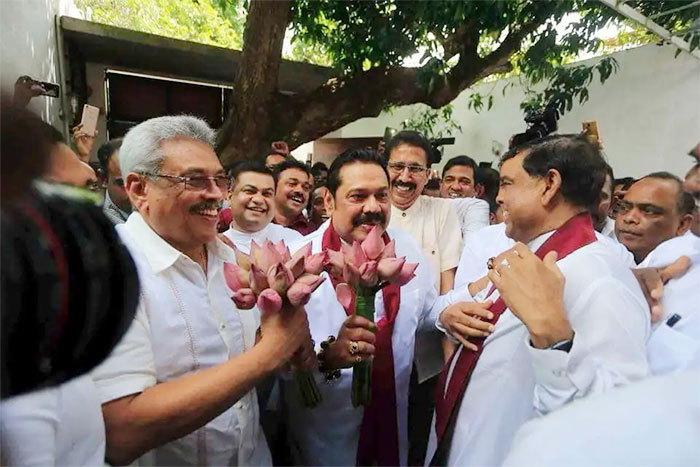

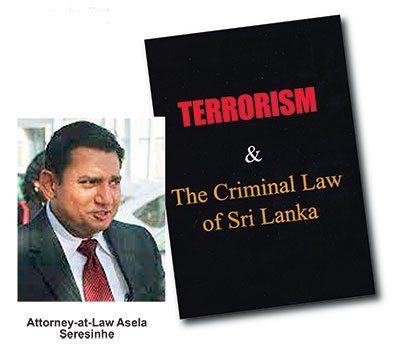 Attorney-at-Law Asela Seresinhe couldn’t have launched ‘Terrorism & the Criminal Law of Sri Lanka’ at a better time. Seresinhe dealt with a range of issues, including money laundering (Prevention of Money Laundering Act No 05 of 2006/page 112). Would the Thico Group of Companies be subjected to a comprehensive inquiry? Only time will tell.
Attorney-at-Law Asela Seresinhe couldn’t have launched ‘Terrorism & the Criminal Law of Sri Lanka’ at a better time. Seresinhe dealt with a range of issues, including money laundering (Prevention of Money Laundering Act No 05 of 2006/page 112). Would the Thico Group of Companies be subjected to a comprehensive inquiry? Only time will tell.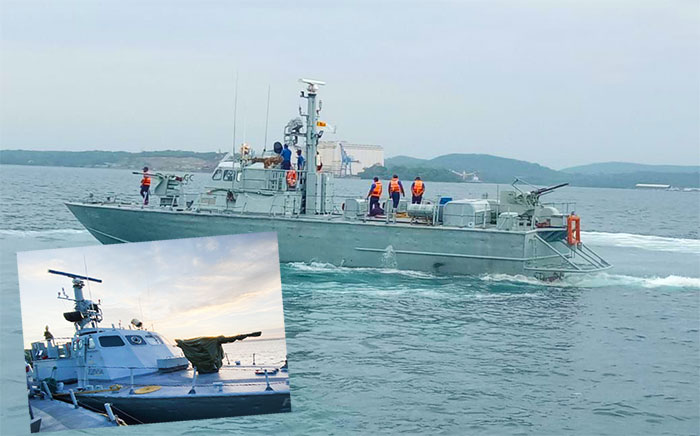
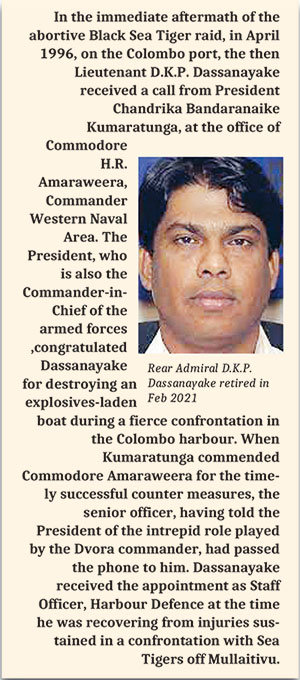 Following the raid on the Colombo port, on April 12, 1996, the LTTE issued two statements from its International Secretariat, situated at 211, Katherine Road, London E 6, IBU, UK. The LTTE credited the Black Sea Tigers with the attack. It also showed how the British continued to mollycoddle the terrorists, on its soil, even long after the Tigers assassinated former Indian Prime Minister Rajiv Gandhi, in May 1991, on all types of pretexts. The UK turned a blind eye to the assassination of President Ranasinghe Premadasa and several lawmakers. Having openly nurtured Tiger terrorists we wonder whether the UK has any right to accuse us of doing any wrong in single handedly crushing that organization, termed by none other than the US Federal Bureau of Investigation, as the most ruthless terrorist organization.
Following the raid on the Colombo port, on April 12, 1996, the LTTE issued two statements from its International Secretariat, situated at 211, Katherine Road, London E 6, IBU, UK. The LTTE credited the Black Sea Tigers with the attack. It also showed how the British continued to mollycoddle the terrorists, on its soil, even long after the Tigers assassinated former Indian Prime Minister Rajiv Gandhi, in May 1991, on all types of pretexts. The UK turned a blind eye to the assassination of President Ranasinghe Premadasa and several lawmakers. Having openly nurtured Tiger terrorists we wonder whether the UK has any right to accuse us of doing any wrong in single handedly crushing that organization, termed by none other than the US Federal Bureau of Investigation, as the most ruthless terrorist organization.